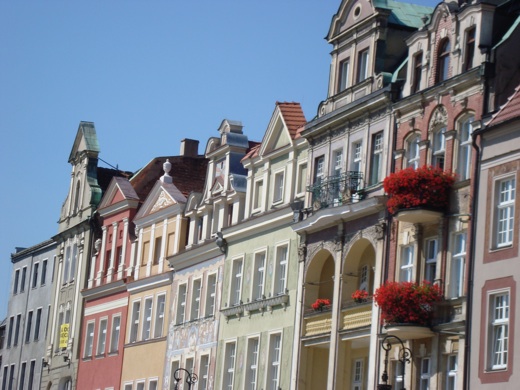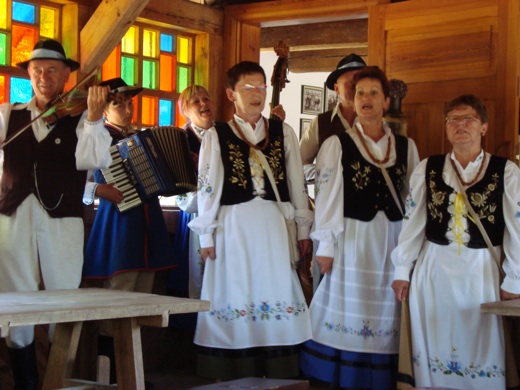When I was growing up in a Polish neighborhood in upstate New York, I wasn’t so interested in the Old Country. My grandparents immigrated to America at the turn of the 20th century, and although my grandpa told me about the ducks on the farm near Warsaw where he lived as a boy, he was, by and large, a quiet man. The Old Country was, well, old, and we were living in the new postwar era in the United States. My parents wanted to move on after World War II, the Depression, my dad’s Navy service in the Pacific, and my mother’s hard factory labor. Like most of their friends, they wanted to be as all-American as they could possibly manage.
“We don’t dress like DP’s,” my mother often said, code for displaced people coming from refugee camps in Eastern Europe to the U.S. in old-fashioned clothes. Their English was broken, and although some moved into our hometown, we were embarrassed to be connected with them in any way.
Yet just like their parents, Mom and Dad sent me to a Polish Catholic school. We also attended a Polish Catholic church in a neighborhood where streets had names like Gorski and Pulaski. We ate kielbasa on Easter morning and danced the polka at weddings. We listened to clarinet and accordion records by Polish-American bands from Chicago on Sunday morning radio shows.

Our culture was a unique combination of ethnic pride and selective memory. No one I knew wanted to see the Old Country. That was the place where poverty choked you until you left, if you could. It was the place where cities had turned to rubble, and where Communists watched your every move, looking for any excuse to send you off to Siberia.
Mothers we knew packed up secondhand clothing, toothpaste, shampoo, and candy to send to family back in Poland. My family didn’t have anyone left there, but my mom still contributed boxes of these items to the parish church for shipping.
In those days, the Poland in our minds was dust-poor, gray, and tragic. But its people who came here were better educated than my ancestors, albeit worse dressed.
We laughed nervously at Polish jokes. Even President Reagan told one, so they had to be okay. It was important to laugh at yourself here in America; we who felt the sting were being too sensitive. We tried to toughen up.
Somewhere along the way, all that changed. I got tired of laughing at my heritage. I wanted to know who I really was. And I wanted to claim the whole package, not just the sanitized version of my grade school teachers, who exhorted us to sing a Polish anthem “loud enough for the Russians to hear.”
I am descended from a flat country, easily conquered and divided, a place with no name for all of the 19th century. My DNA goes back to a place, where in 44 years of atheist totalitarian rule, not one church closed its doors. Its strands tie me to the old men, women, and teenagers who crawled through Warsaw’s sewers in 1944, desperate to take back their country from Nazi occupation. Both sides of my family have roots in Torun, Poznan, and Wojtowa, a village southeast of Krakow. I have a funny-sounding, hard-to-spell last name, thanks to my Polish-American husband, added to my equally hard-to-pronounce maiden name.
Sadly, my people also came from the land where millions of people, mostly Jews, were exterminated. Though many Poles hid and rescued them, many did nothing out of fear for their families’ lives. And many reacted out of the anti-Semitism they learned as children. Some Poles even killed Jewish survivors returning home after the war.
Because of this, I traveled to Poland this summer with Elderhostel – an educational tour group for people over 55 – anticipating equal doses of pride and shame. At Auschwitz, I listened to a young Polish guide quote the words of German anti-Nazi theologian Martin Niemoller: “When they came for the Jews, I said nothing.”

The next morning, Robert Gadek, a Jagiellonian University graduate, told the story of Jews in Poland, with none of the denial or self-justification I have heard among Polish Americans. He started a Jewish cultural festival that 30,000 people attended last year. He and the many people we met there were happy, purposeful, busy, and so proud that the fall of Communism started here. They were not embarrassed to be Polish. They were hopeful.
Much hope can be found in Poland’s musical traditions. A Chopin concert welcomed us to our first evening in Warsaw 200 years after his birth. Opera songs bid us goodbye on our last evening in a castle lovingly restored by a young archeologist and his wife. And in between, at Wdzydze, the costumes, smiles, and lilting melodies of the folk musicians seemed to reach deep into my past, connecting me to the place where loving grandparents, aunts, and uncles also shared a bond.
Now back home in the United States, friends smile indulgently at my correct Polish pronunciation: ‘Krah-Koov’ as opposed to the soft and Anglicized ‘Crack-cow.’ I tell them I prefer the hard Polish consonants and long broad vowels. I think about the signs for Piwo, Kawiernia, Taverna, and Ksiazki that we drove by, trying to grasp the meaning behind their names.
Like cracking a secret code I forgot I knew, my first trip to my grandfather’s homeland opened up a new understanding of him, my people, and myself.
- Follow us on Twitter: @inthefray
- Comment on stories or like us on Facebook
- Subscribe to our free email newsletter
- Send us your writing, photography, or artwork
- Republish our Creative Commons-licensed content

